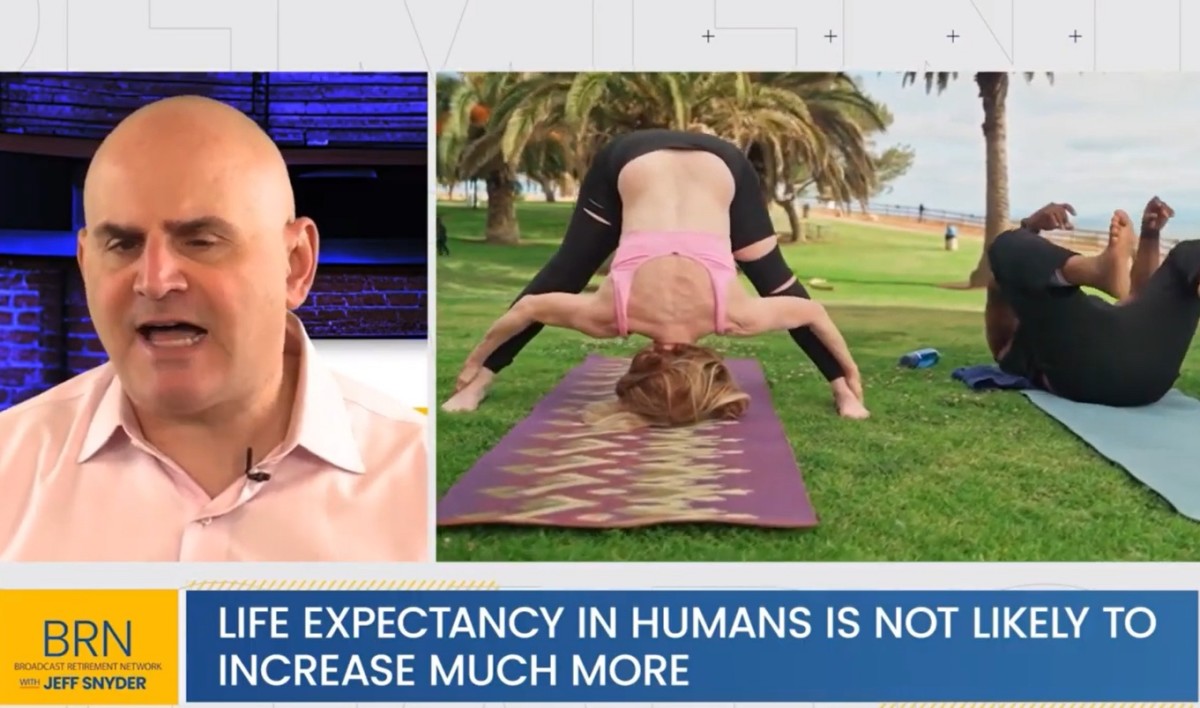Life Expectancy in Humans is Not Likely to Increase Much More
Broadcast Retirement Network's Jeffrey Snyder discusses whether science can extend human life with University of Chicago Illinois' S. Jay Olshansky, PhD. Jeffrey H. Snyder, Broadcast Retirement Network This morning on BRN, life expectancy in humans is not likely to increase much more. Joining ...

Recent studies suggest that human life expectancy may have reached its peak
Broadcast Retirement Network's Jeffrey Snyder discusses whether science can extend human life with University of Chicago Illinois' S. Jay Olshansky, PhD.
Jeffrey H. Snyder, Broadcast Retirement Network
This morning on BRN, life expectancy in humans is not likely to increase much more. Joining me now to discuss this, Dr. Jay Olshansky, is a professor of epidemiology and biostatistics at the University of Illinois, Chicago. Dr. Olshansky, great to see you. Thanks for joining us this morning.
S. Jay Olshansky, PhD., University of Illinois, Chicago
Thanks for having me. It's delightful.
Jeffrey H. Snyder, Broadcast Retirement Network
Yeah, and we're going to talk about something that I think is probably pretty important for everybody, whether they live here in the States or they live around the world, and that's life expectancy. And you and the team did a lot of research around this. I guess my first question is around all the medical developments that we've had over the last 30, 40, 50 years, we've been able to extend life beyond the typical life expectancy of bygone errors.
And my question is, from a life expectancy perspective, have we hit the max? Have we tapped out as far as we can take human longevity?
S. Jay Olshansky, PhD., University of Illinois, Chicago
Not really. So look, if you go back in time, think of two sets of toolboxes that humanity created for longevity. One was a set of toolboxes in the early 20th century designed to combat childhood diseases, infectious diseases.
Women who died during childbirth. We succeeded. Public health really did a remarkable job in the early 20th century.
We dramatically reduced early age mortality. We enabled most people to survive beyond the age of 60, 65 during the course of the 20th century. So the first toolbox we created saved the young.
The second toolbox that was created by medicine and public health really came into effect in the latter part of the 20th century. It reduced middle age and old age mortality. Actually, the diseases that we traded for when we saved children.
So heart disease, cancer, stroke, you know, the things that kill us at later ages. We succeeded quite dramatically in extending life by, you know, detecting diseases earlier, improving behavioral risk factors. There's lots of things that we did that worked.
And today, look, we have, you know, statins to deal with cardiovascular disease. We have stents. We have chemotherapy, radiation therapy.
We have an incredible toolbox to deal with many of the diseases that we traded for. It's just that, and my colleagues and I have argued this for quite some time now, that the effects of these interventions must wane. They must slow down.
And when I say the word must, I mean it literally. And the reason is fairly straightforward. When you succeed in enabling people to live very long lives, into their 70s, 80s, 90s, and plus, what happens is that one particular cause of death or contributor to the major diseases that influence us, influence almost everyone, is the underlying biological process of aging, the changes that occur in cells and tissues and organs as we get older.
That's currently immutable. So, when you push more people up against this limit of immutability of the biological process of aging, then the rise in life expectancy must slow down. Now, this was a hypothesis we set forth in 1990 in an article in Science.
We waited 30 years. We've now tested it. The latest article that just came out in Nature demonstrates that, in fact, this is exactly what has happened.
So, is there still room for improvement? Of course. Can people adopt healthier lifestyles and lengthen their lives a bit?
Yes, absolutely. Can we achieve the radical life expectancy gains that we achieved in the 20th century? No.
It is not possible based on any technology that exists today. Remember, the vast majority of that increase was a result of saving the young. The young can only be saved once.
Now we have to save older individuals, and therein lies the dilemma that we put ourselves into.
Jeffrey H. Snyder, Broadcast Retirement Network
Forgive me, doctor. I'm a layperson. I took biology in high school, and I think after that I kind of moved on to other things.
But can we evolve as a species? I think history is littered with species that have evolved over time to deal with certain climate conditions. So, could the human species evolve to live longer, to take into account, okay, we've got this medical toolbox now that's available.
So, can it adapt the body to live longer, or is that not possible?
S. Jay Olshansky, PhD., University of Illinois, Chicago
Well, so, it's an interesting question because you're really talking about a couple of things here. One is basic evolution itself, and of course evolution is always happening. But as it turns out in humans, we've been like this for over 200,000 years, anatomically modern humans haven't changed at all.
So, the genome that you and I inherited, we inherited from people that arose 200,000 years ago. It hasn't changed. So, the diseases that we experience are going to be the same kinds of diseases that would have been experienced by our ancestors 200,000 years ago if they had lived long enough.
So, we've actually created these circumstances that are extraordinarily unusual. So, if you mean evolution in the literal sense, it's not going to happen in our lifetime to influence people alive today. Now, if you mean by evolution, we can adapt to these changing environmental conditions, well, it becomes difficult as long as the biological process of aging operates and marches on.
Look, it's a byproduct of operating this machinery of life. Each day we wake up, we live, we eat food, we breathe. The whole process of living creates a damage to our cells and tissues and organs and organ systems that accumulates with the passage of time.
Now, we have these absolutely remarkable mechanisms for repairing the damage to our DNA that accumulates with time, but it's not perfect. And that lack of perfection, which I don't really see changing anytime soon, is the problem. And so, that's the immutable force that I've been talking about.
Now, this is where I think you might be going with this question. Is it possible to intervene in fundamentally different ways, for example, by altering the biological process of aging itself? And if you go to the end of the manuscript, we basically say, yes, we think this is possible.
It's called geroscience. It's this effort to go after the general process of aging or senescence itself. It's been demonstrated to be, it can be done in other species.
There's reason it can be done in humans. The problem is that we can't determine in advance how much longer we might live as a result of any intervention that modulates aging. If somebody comes along and says, yeah, here's a pill that you can take that's going to make you live 50 years longer, well, you're going to have to wait 50 years to know whether or not that's true.
So, any sort of radical life extension like that observed in the past that would be achieved in the future by reducing old age mortality is an untestable scientific hypothesis. You can't prove it. And so, in the absence of being able to prove that any of these interventions with aging would actually work, we've suggested, and our language was pretty clear in the manuscript, that our focus should not be on length of life.
It should be on quality of life. And this is something you can actually measure in short time periods. We can experience it firsthand.
So, healthspan, I think, should be the goal, not lifespan extension.
Jeffrey H. Snyder, Broadcast Retirement Network
Last question for you, Doctor. There are obviously healthy lifestyle changes you can make that will help extend your life. And if there is a finite amount of time that you can extend life based on the science, are there lessons here for policymakers?
Aging, you know, we have an aging America. You look around the world, most societies have a lot of aging members. I mean, we're seeing the silver tsunami and other aspects.
Are there lessons here for our policymakers about society and what we can and can't do?
S. Jay Olshansky, PhD., University of Illinois, Chicago
Well, a couple of things to keep in mind. The prevalence of older people, just the absolute number of older people in the United States and across the globe, developed and developing countries alike, is going to increase dramatically in this century. It's baked into our age structure.
So, there is no question that the absolute number of older people is going to increase quite rapidly. I mean, look, I can tell you the exact year in which we're going to start to see a pretty large increase in the number of centenarians. It's going to be 2046.
And the reason is that's the 100-year anniversary of the beginning of the baby boom generation that began in 1946. So, the rise in the prevalence is baked in. It's going to happen.
We can't stop it. Don't confuse the rise in the prevalence of older individuals with rise in life expectancy. You can actually have a drop in life expectancy and a rise in prevalence.
That's exactly what's happening in the United States. So, we need to prepare for these longer lives, for more people living longer lives. And we are not adequately prepared.
I mean, this is really a major problem in the United States where individuals are going to make it out to older ages without the financial resources to cover the amount of time that they're going to be living in older age. Now, truth be told, in the earlier part of this century, not that long ago, 20 years ago, in the world of financial services, it was planned to live to 100. And if you read the manuscript very carefully, we said this is profoundly bad advice because most people aren't going to make it that long.
And if indeed you do change your entire life and work pattern and everything, on the assumption you're going to live to 100, you're going to be planning for time that you're not going to live, for most people aren't going to live. And you're really going to miss out on a lot of what's important in life, you know, when you're healthy, when you're younger. Look, I'm 70 years old.
I actually consider myself relatively middle-aged. And, you know, for the next 10 years, my wife and I really want to experience things that we haven't been able to experience before. So it requires a different line of reasoning.
You know, what are the chances we're going to make it to 100? Not very good. And it really applies to the rest of the population, but it doesn't mean that the absolute number won't increase dramatically.
Now, your other question was a critical one, and it's been coming up since our paper was published, and that involves lifestyle modification. You know, not smoking, reducing body fat. There's lots of things that we can do today that can improve our health and quality of life.
Exercise and diet work. Pharmaceuticals work. You know, going to your doctor and taking pharmaceuticals to deal with problems that occur with older bodies.
There can be people that live perfectly healthy lifestyles, you know, very low body fat. They exercise every day, and they can still develop cancer. They can still develop cardiovascular disease.
They can still have diabetes and high blood pressure. But fortunately, we have medications to deal with these issues, and they work. They're incredibly powerful.
They restore mortality risk back to normal. So what that means, of course, is that if you can avoid many of these drugs and interventions, you know, stents and, you know, surgical procedures of one kind or another with better lifestyles, you don't gain much in life expectancy as a result because we've already taken care of the negative consequences of having these harmful behavioral risk factors through surgery and pharmaceuticals and, you know, and other medical interventions that actually work.
So it's a little surprising when I tell people that the rise in life expectancy as a result of everyone adopting a perfect lifestyle isn't going to be nearly as large as you think. But it probably would make a lot of people live healthier, longer, and in the end, that's the primary metric of success as far as I'm concerned. So yes, we all should be adopting healthier lifestyles, exercise, eating right.
Look, right after this call is over, I'm going to go do my five-mile walk. So, you know, I know exactly what it is that works, and I think everyone else should as well. It's not a secret.
You know, our parents and grandparents have known for a long time.
Jeffrey H. Snyder, Broadcast Retirement Network
All you got to do, as a mentor of mine should say, all you got to do, sir, is just, you just got to do it. Dr. Olshansky, great research and interesting perspective. I think you've given me and I think the audience a new perspective to think about.
Great to see you. Thanks for joining us. And look, we look forward to having you back on the program again very soon.
S. Jay Olshansky, PhD., University of Illinois, Chicago
Thanks for having me.
Jeffrey H. Snyder, Broadcast Retirement Network
And don't forget to subscribe to our daily newsletter, The Morning Pulse, for all the news in one place. Details, of course, at our website. And we're back again tomorrow for another edition of BRN.
Until then, I'm Jeff Snyder. Stay safe, keep on saving, and don't forget, roll with the changes.
What's Your Reaction?




















































